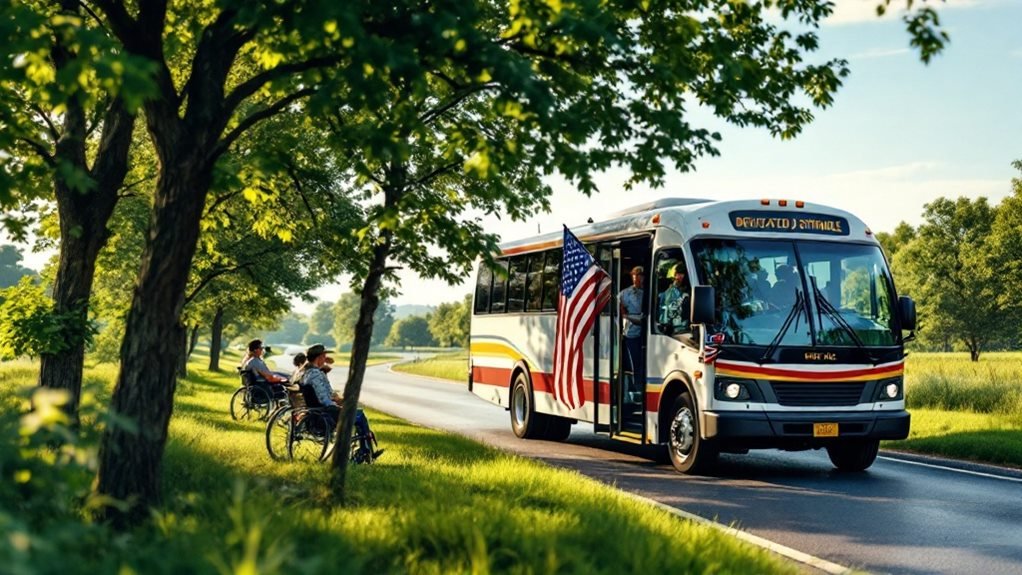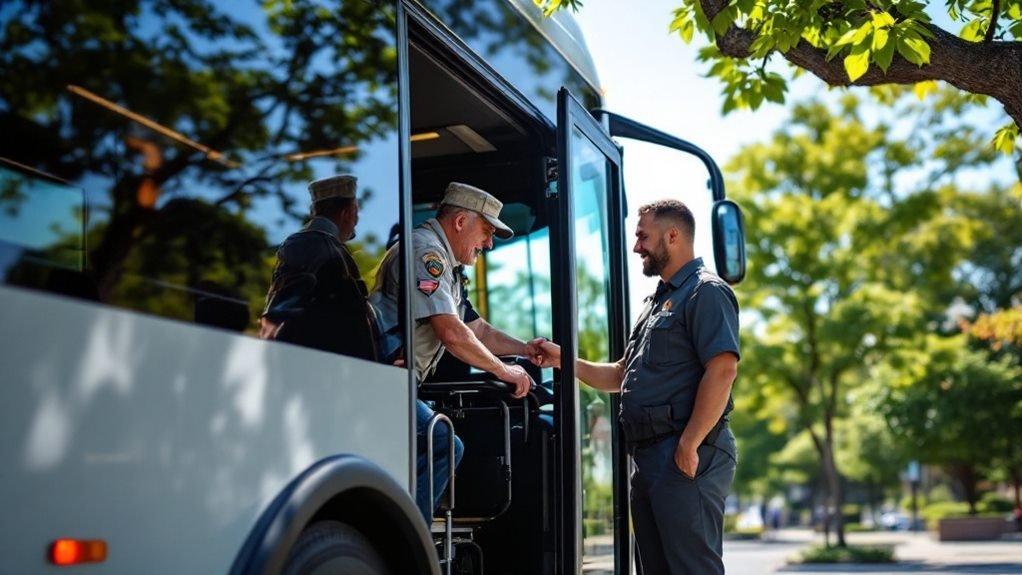When considering the top pay for school bus drivers, think about the impact of location, weigh the importance of experience, and understand the role of additional certifications. You might be curious how drivers in bustling cities can earn over $60,000, while their rural counterparts earn considerably less. Does union membership really make a difference in their paychecks? If you're wondering how to maximize earnings or what future trends could mean for the profession, there's a lot more to discover. So, what factors truly set the top earners apart in this essential role?
Key Takeaways
- Urban school bus drivers can earn up to 20% more than rural drivers due to higher demand.
- Experienced drivers with over ten years can earn up to 30% more than entry-level drivers.
- Unionized school bus drivers typically earn 15% more than non-unionized counterparts.
- Drivers in states with extensive training requirements, like New York, often receive higher salaries.
- Obtaining a CDL with passenger and school bus endorsements can significantly increase a driver's earning potential.
Factors Affecting Driver Salaries
Several key variables play an essential role in shaping school bus driver salaries. One notable factor is driver qualifications. When you possess a commercial driver's license (CDL) with passenger and school bus endorsements, your earning potential increases.
Additional qualifications, such as a spotless driving record and first aid certification, can further elevate your salary prospects. Employers value these credentials as they reflect your commitment to safety and professionalism, vital traits for those responsible for transporting children.
Understanding the intricacies of salary negotiation also impacts your earnings. When you're well-prepared with data on average salaries in the industry, including benchmarks for qualifications and experience, you can effectively advocate for a higher wage.
Knowing your worth and communicating it confidently can make a considerable difference in the offers you receive. Engage in negotiations with a mindset that highlights your dedication to student safety and punctuality.
Moreover, experience plays a pivotal role. As you accumulate years behind the wheel, your expertise grows, making you more attractive to employers who are willing to pay a premium for seasoned drivers.
Balancing qualifications, negotiation skills, and experience can markedly enhance your salary as a school bus driver.
Geographic Impact on Earnings
Location greatly influences school bus driver salaries, and understanding this geographic impact is essential for maximizing your earning potential.
Urban vs rural settings play a pivotal role in determining pay scales. In urban areas, the demand for school bus drivers is often higher due to larger student populations and more complex transportation needs. Consequently, salaries tend to be more competitive. According to recent data, urban school bus drivers can earn up to 20% more than their rural counterparts. This discrepancy is mainly due to the increased cost of living and higher demand for services in cities.
State regulations also considerably affect earnings. States with stringent safety and training requirements may offer higher wages to attract qualified drivers. For instance, New York requires extensive training and background checks, resulting in some of the highest school bus driver salaries nationwide. Conversely, states with fewer regulations might offer lower pay, impacting your overall earning potential.
Moreover, school districts' funding levels, often influenced by state and local government budgets, can vary widely, affecting salary ranges.
Experience and Pay Correlation
Experience plays a significant role in determining a school bus driver's salary, with data showing a clear correlation between years of service and pay increases. As you gain more experience, you can expect your earnings to reflect your dedication and expertise.
Industry data indicates that entry-level drivers typically start on the lower end of pay scales, often earning 15-20% less than their more seasoned counterparts. By reaching mid-level experience, usually around five to ten years, you might see a salary increase of up to 25%.
The rationale behind this correlation is straightforward: with increased experience levels, you enhance your ability to handle complex situations, ensuring the safety and well-being of students. School districts recognize this value by offering higher pay scales to experienced drivers.
For instance, a driver with over ten years of experience may earn up to 30% more than someone just starting, reflecting their proven track record and reliability.
Ultimately, your commitment to serving others through safe and reliable transportation doesn't go unnoticed. By investing in your career and gaining experience, you're not only improving your skills but also positioning yourself for favorable compensation aligned with your dedication and expertise.
Importance of Additional Certifications
While experience undeniably impacts a school bus driver's salary, additional certifications also greatly influence earning potential and job stability. By obtaining various certification types, you demonstrate a commitment to safety and professional growth.
Safety training, such as CPR and first aid courses, is essential, enhancing your ability to handle emergencies and ensuring passenger well-being. This directly correlates with increased job security and potential salary increments, as schools prioritize drivers who can keep students safe.
Analyzing data from transportation departments reveals that drivers with advanced certifications often earn more than their peers. For instance, a Commercial Driver's License (CDL) with passenger (P) and school bus (S) endorsements is typically required, but acquiring endorsements like air brakes or hazardous materials can set you apart.
These certifications not only boost your skill set but also make you a more attractive candidate for higher-paying positions. Incorporating continuous safety training into your career path reflects a proactive approach to professional development.
It indicates you're not just fulfilling basic requirements but exceeding them, thereby positioning yourself as a leader in the field. This dedication to improvement can lead to more rewarding opportunities, both financially and professionally.
Role of Unions and Associations
Unions and associations play a pivotal role in shaping the work environment and compensation for school bus drivers. Through union negotiations, you can achieve better pay rates, improved working conditions, and job security. Data from the Bureau of Labor Statistics indicates that unionized drivers earn, on average, 15% more than their non-unionized counterparts. This difference stems from collective bargaining, where unions advocate for fair wages and equitable treatment.
Association benefits extend beyond salary enhancements. They often include access to professional development opportunities, legal support, and representation in disciplinary matters. By being part of an association, you gain a collective voice that can influence policy decisions affecting your profession.
For example, successful negotiations have led to implementing safety measures and updated training programs, directly impacting your daily operations and passenger safety.
Moreover, unions and associations frequently conduct surveys and research, providing critical data to support their advocacy efforts. They utilize this data to identify trends, address grievances, and propose actionable solutions, benefiting not only you but also the broader community.
Benefits and Incentives Offered
When considering a career as a school bus driver, understanding the benefits and incentives offered can greatly impact your decision. You'll find that health insurance is a standard offering, ensuring you and your family's well-being.
Schools often provide extensive retirement plans, such as 401(k)s or pensions, which contribute to long-term financial stability. Flexible scheduling is another perk, allowing you to balance work with personal commitments, a key factor for those dedicated to serving others.
Training programs are frequently available, enhancing your skills and ensuring you're well-equipped to handle the demands of the job. These programs often include safety incentives, rewarding you for maintaining a secure environment for students.
Employers might offer bonus opportunities for exemplary performance or attendance, adding to your overall compensation. Job security is typically strong in this field, given the constant need for reliable transportation for students.
Overtime pay can further boost your earnings, especially during busy periods. The combination of these benefits and incentives not only supports your immediate needs but also contributes to your long-term career satisfaction and professional growth.
Analyzing these elements can guide you towards a fulfilling role as a school bus driver.
Seasonal and Part-Time Variations
As you evaluate the benefits and incentives for school bus drivers, it's important to contemplate the impact of seasonal and part-time variations on your career. During peak seasons, such as the start and end of the school year, the demand for school bus drivers typically increases. This heightened demand can lead to potential pay enhancements or bonuses, providing you opportunities to maximize your earnings.
Data indicates that peak seasons can see a surge of up to 15% in driver demand, aligning with increased student enrollment and special events.
Part-time opportunities offer flexibility for those seeking a balanced work-life schedule. It's worth noting that approximately 30% of school bus drivers work part-time, leveraging varied schedules to pursue other personal or professional commitments.
Part-time roles can be particularly beneficial if you're looking to supplement your income or gradually shift into the field.
Analyzing these variations allows you to strategically plan your career path, aligning your work schedule with peak demand periods to optimize income potential. A focus on serving others in a role that accommodates your personal needs can enhance job satisfaction while meeting community transportation needs.
Tips for Maximizing Income
Maximizing your income as a school bus driver requires a strategic approach that involves understanding compensation structures and leveraging available opportunities.
Begin by evaluating your current pay scale and identifying any incremental increases tied to years of service or additional certifications. This data can provide a foundation for effective negotiation strategies.
Approach your supervisor with a well-researched proposal, highlighting your contributions and any relevant certifications that enhance your value.
Exploring overtime opportunities is another effective strategy. Many districts offer additional pay for extracurricular trips or late-night events.
By volunteering for these shifts, you can greatly boost your earnings. Keep track of district announcements or communicate with other drivers to stay informed about these opportunities.
Consider enhancing your skills through training, such as obtaining a Commercial Driver's License (CDL) with passenger endorsement if you haven't already.
Such qualifications not only improve your negotiation leverage but also open doors to higher-paying routes or positions within the transportation department.
Future Trends in School Bus Driving
A myriad of emerging trends is set to transform the landscape of school bus driving in the coming years.
Automation impact will be significant; advanced technologies like GPS and AI are expected to optimize routes, reducing travel times by up to 20%. As a school bus driver, you'll find these tools invaluable for enhancing safety and efficiency. However, automation isn't about replacing you—it's about empowering you to offer a more reliable service.
The integration of real-time data analytics will also allow you to anticipate traffic patterns and weather changes, ensuring smoother and more timely operations.
Electric buses are another transformative trend. They present an eco-friendly alternative, reducing emissions by 98% compared to traditional diesel buses.
Shifting to electric buses doesn't just benefit the environment; it also lowers fuel and maintenance costs, potentially increasing operational budgets. As schools adopt these buses, you'll likely receive training on their unique features and maintenance needs.
Conclusion
To maximize your earnings as a school bus driver, think like Odysseus steering through the seas—consider location, experience, and certifications your guiding stars. Urban settings often pay more, especially with a CDL, and unions can act as your Athena, offering higher wages and benefits. Keep an eye on funding trends and training opportunities; they're the secret maps to better pay. Immerse yourself in these data-driven insights, and you'll find your own golden fleece in this evolving field.



